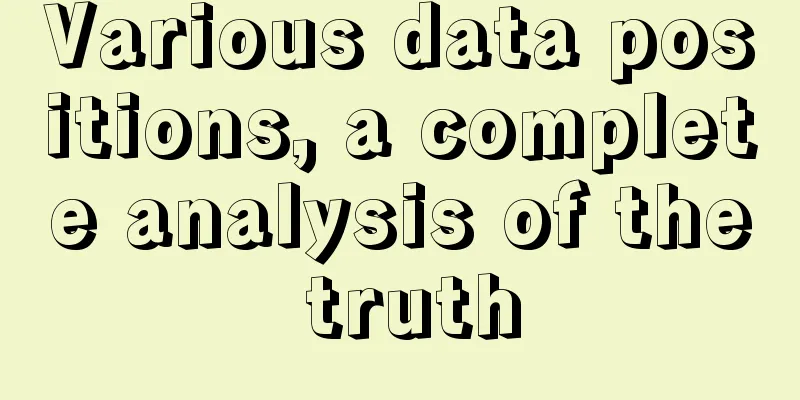Various data positions, a complete analysis of the truth

Many students want to join the data industry, and many students want to move to a higher level. However, do you really know what a "data analyst" is in the eyes of companies? What are the differences between data analysis, business analysis, operational analysis, business analysis, strategic analysis, data operations, BI analysis, etc.? Today we will analyze it systematically so that you won’t get lost in the workplace in 2025. 1. Starting from the data sourceThere are four common sources of enterprise data: ● Industry data: industry conditions and macro data, usually provided by a third party ●User data: directly send questionnaires to survey users/stores/dealers ● External system data: For example, operating Tmall stores, Amazon and other platforms, platform data ●Internal system data: data recorded by the company’s own transaction system, ERP, CRM, website, and APP These four data sources correspond to four completely different directions: ▌Industry research line: industry data → industry research → strategic/tactical direction. Generally, only industries that are sensitive to industry policies, such as banks and securities, have full-time positions in large group headquarters to do this, corresponding to the industry research line. The industry research line does not require any development skills. The key is: how much you know about the industry. ▌Market research line: Questionnaire/interview → market research → marketing/design direction. Market research is very popular and mature in traditional enterprises such as fast-moving consumer goods, retail, chain stores, and durable goods design. In large Internet companies, there may be a research center, but in small Internet companies, product managers and operations are probably doing it by themselves. The key to this line is: questionnaire design, interview design, data summary and other research-related experience. ▌Platform operation line: use the platform → organize reports → operational suggestions. This category is often called "Taobao/Amazon/e-commerce data analysis" or "sales analysis" or "supply chain analysis". These are what we commonly call "cousins". The main task every day is to export Excel tables from the e-commerce platform for secondary processing. Since the data is a fixed report, the ability to interpret the business is very important, otherwise it will become a pure table porter. ▌Data development line: internal system → data warehouse → data model/data middle platform → data product (BI). This line is also called "data development", "BI engineer" and "big data engineer". Here, data warehouse development requires relevant experience in Hadoop and data warehouse modeling, which is responsible for a dedicated person; BI tools, based on SQL data extraction of wide tables, are handled by another group of dedicated people. ▌Data analysis line: Provide data services for business, also known as data BP/business analysis/operation analysis/commercial analysis... Yes, data analysis in a narrow sense is these. These positions need to meet business needs, provide data interpretation, analysis reports, dashboards, etc. In short, they are business-oriented rather than development-oriented. The above five categories are all data-related jobs. If the company clearly distinguishes them, there will be five different positions. Of course, some companies make very messy distinctions. 2. The root of the confusion is hereTheoretically, the ideal state is: ● All five data development lines are complete (data warehousing, data modeling, data products, data analysis, data governance) and belong to IT management ●Market research and industry research are managed in a unified manner and belong to the marketing department or strategic development department and business management. ●All business analysis should not be a separate position, the people doing the work must have analytical skills This way, the division of labor is clear, and everyone works, reports, and is promoted. The route is clear, and it can maximize the effect. The theory is beautiful, but the reality is cruel. Such a structure has many requirements for the company: ●The enterprise is large enough● Leaders are very clear about the source, production and function of data ●HR is very clear about the source, production and function of data ● The division of labor and responsibilities in the enterprise is very clear, and there is no fighting between them ●IT departments are respected and invested in ●Business departments have sufficient ability to interpret and apply data ●Leaders perform their respective duties and cooperate with each other ●Leaders have a clear understanding of development goals You will find that the above 8 conditions often do not exist. Primary question: ● The company is not big enough and one person is required to do many things ●The leader himself is confused: “It’s just a piece of data. One person is not enough? Should we get two people?” ● The HR girl was confused: "You need to be familiar with Python, R, SPSS, and EXCEL tools Yes, when recruiting, if you write "familiarity with Python, R, SPSS, EXCEL tools" in the job requirements, it basically only requires EXCEL. The SPSS requirement is basically a job requirement from Baidu by the HR girl who doesn't know much about it. This naturally makes it easy to confuse various positions, and finally recruit people who are not the right ones. Intermediate Questions: ● Operations/marketing/promotion are dissatisfied with the slow efficiency of IT work and want to hire someone to collect data ● Operations/marketing/promotion people are not capable of interpreting data, so find a younger brother to code the Excel spreadsheet ●IT internal management is chaotic, and it is getting anxious when someone asks for the data. We need to hire someone to collect the data. ●IT department is underinvested. Anyway, anyone can do all the data related work. In this situation, it is often found that those with the title of "data analyst" are actually doing odd jobs. They have to code Excel spreadsheets and run SQL statements endlessly every day. They are also asked to deal with all kinds of messy IT issues. When they really do this, these students are the ones who complain the most. It's miserable. Advanced Questions: ●The business department thinks "big data is so powerful", I need someone who understands "big data" to help me solve problems such as traffic generation, sales, product selection, and activation ●The business department thinks "our IT staff don't know how to use data, I need a data expert!" ● The IT department thinks that "the boss really likes the data middle platform", I want to build a data middle platform, no matter what it does. In this situation, it is common to see a young man/woman happily go to an interview, but in the end, he/she does not know what he/she is doing, and the performance direction is unclear. The business leader keeps complaining that he/she "does not have any valuable output", and the IT leader always asks him/her to build a "middle platform" or "model", but in the end, he/she does not know what he/she has built. In the end, nothing is done, and he/she is kicked out next year. In essence, it is not that he/she is incapable of doing the job, but that the bosses themselves have not thought it through. 3. Clarify “What is this data analyst saying?”Here are some key questions to ask directly: First ask: Is the department under development or business? If it is an IT department, continue to ask: Is there an independent data department? ●Is there anyone doing data warehouse and ETL? ●Are there clear data products? ●Data middle platform/user portrait/data model, are there any clear application scenarios? If it is a business department, continue to ask: ●The data analyzed is (research, internal system, platform, third party) ●Who you report to (a dedicated data leader or a business line leader) ● Need to submit data by yourself/have IT support ● What scenarios does the leader mean by “in-depth analysis” (or give a few examples yourself to see if the other party is satisfied) 4. Opportunities and challenges always coexist We all hope to join a company with a complete structure, reasonable division of labor, and clear goals, so we can do more work when we understand the position. However, if the position is not clear, it does not mean that there is no opportunity at all: ● Unclear structure: You can create your own world ● Unclear goals: Find ways to combine business to achieve results ●The position is very basic: a large platform can gild your career ●Business leaders have expectations: if you do well, you will be promoted ● Or simply, if you want to change your industry or position, just do it as long as it's not too bad. Risks always coexist with opportunities, and success always belongs to those with strong abilities, so there is no need to be terrified by the risks. However, you need to be prepared accordingly, both technically and psychologically. Many students have a cute "learning" mentality, but end up entering companies with incomplete structures, unclear responsibilities, and unclear goals, and naturally get beaten to a pulp. Similarly, people need to be fierce in the wild and humble in the temple. Only by choosing methods according to specific scenarios can you go the longest. |
<<: Xiaohongshu’s category scene content is becoming ineffective…
>>: TikTok has “resurrected” in the United States. What do practitioners think?
Recommend
How can individual merchants start trading on Xiaohongshu at low cost? Attached is a low-cost strategy example
How can a business start an account on Xiaohongshu...
“Old Hongshu” is losing blood. Can the content business for the elderly still be successful?
In recent years, in order to compete for the elder...
How to increase traffic for a new Shopee store? Method introduction
Traffic is an important basis for store conversion...
What is a data analysis project and how to do it?
Many students who are responsible for data will wa...
How should I choose products when I first start selling them on Amazon?
It is easy to register an Amazon store, but it is ...
10 rules for World Cup marketing
The World Cup, which is held every four years, is ...
How to write new media titles? 10 practical methods behind thousands of popular titles!
A good title is like a magnet that can quickly att...
A comprehensive analysis of the popularity of Zibo barbecue and the steps and system of brand hot spot marketing
The author of this article uses the classic framew...
The "Pinduoduo" of milk tea: less than 10 yuan per cup, 2.5 billion sold in a year
Have you heard of the milk tea brand Tianlala? Whi...
Which Amazon payment platform is better? Does the account have to be a legal person?
Running a store on Amazon, we work hard every day ...
When doing data analysis, keep this underlying logic in mind!
"The key to revealing the underlying logic of...
How do Chinese people register on etsy? What information do I need?
Etsy has opened entry channels to 45 countries, al...
Retail Discount 3.0 Era: The Secret of Low Prices is Here
You can see those retail stores everywhere on the ...
How to interpret Chinese New Year with "dragon content"? Check out these 6 highly praised brand cases!
China is about to usher in a new year - the Year o...
Design Meditations | Using logic-driven design to create sustainable industrial growth
Today, I will start with the project and deeply an...









